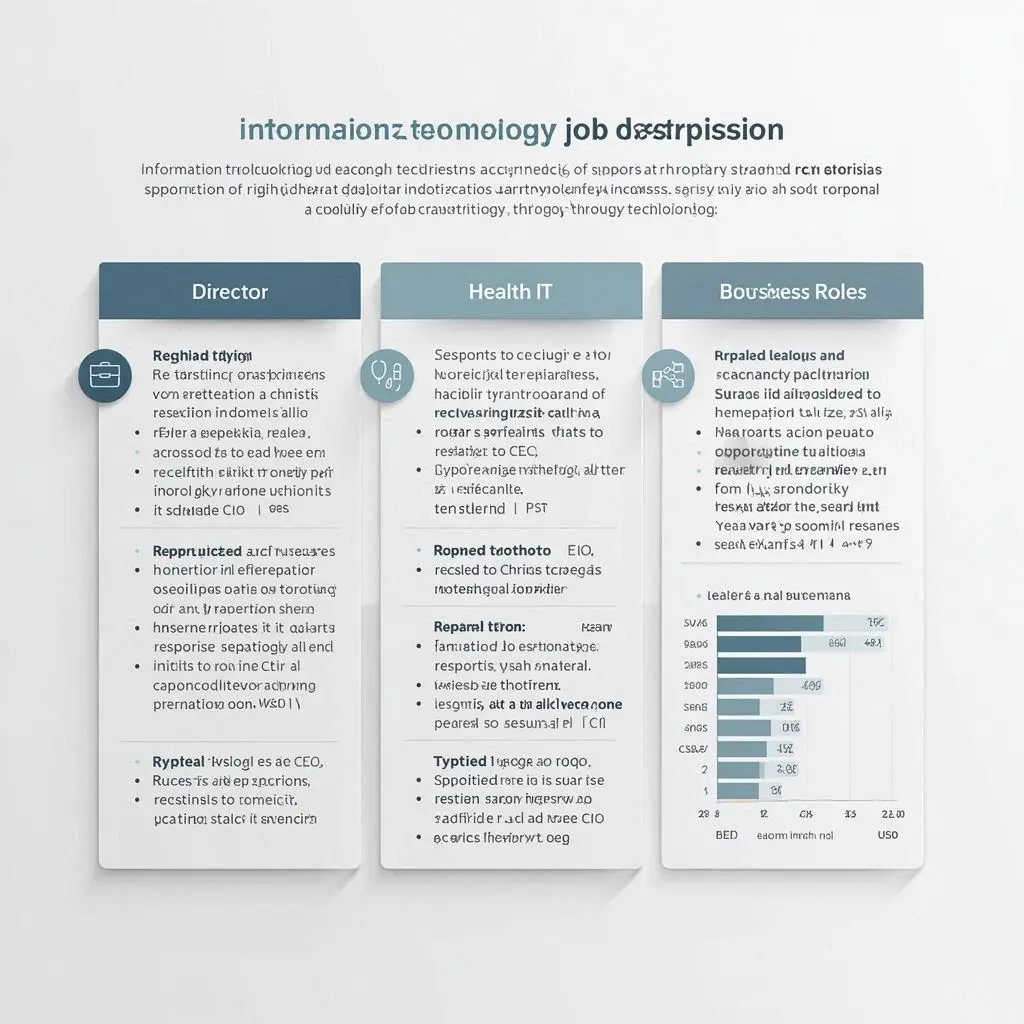
Comprehensive Information Technology Job Description: Director, Health IT, and Business Roles with Salary Insights
Introduction
Information technology job descriptions encompass a broad spectrum of roles that support digital transformation across various industries. From strategic leadership to healthcare informatics and business IT integration, each role plays a crucial part in advancing operational efficiency through technology.
INFORMATION TECHNOLOGY JOB DESCRIPTION
Information technology roles are foundational to modern businesses, covering everything from software development to cybersecurity and infrastructure management. These positions generally require strong technical knowledge, problem-solving abilities, and a solid understanding of system architecture. Professionals working in IT ensure the functionality, security, and advancement of digital systems across organizations. They are responsible for maintaining hardware and software, managing networks, supporting users, and often leading technology-based initiatives to support growth.
A career in IT offers diverse paths, starting from entry-level technical support roles to advanced careers in software engineering, data analysis, and cloud computing. Most positions require formal education in computer science or a related field, along with practical experience and professional certifications to stand out in a competitive job market.
DIRECTOR OF INFORMATION TECHNOLOGY JOB DESCRIPTION
The role of a director of information technology is one of leadership, oversight, and strategic planning. This executive-level position involves setting long-term goals for the IT department and ensuring that all systems and processes align with broader business objectives. Directors are responsible for managing teams, evaluating emerging technologies, and overseeing large-scale implementations and upgrades.
In this role, it is essential to possess not only advanced technical skills but also strong business acumen. The director must understand how technology impacts revenue, customer satisfaction, and operational efficiency. A deep understanding of enterprise architecture, data governance, cybersecurity, and project management is essential. Directors typically work closely with other executives to ensure IT initiatives support the overall vision of the organization. Salaries for IT directors in the United States generally range from $140,000 to $190,000 per year, depending on experience and location.
HEALTH INFORMATION TECHNOLOGY JOB DESCRIPTION AND SALARY
Health information technology focuses on the management of healthcare data and the implementation of systems that improve patient care and organizational compliance. Professionals in this field often work with electronic health records, health informatics, and secure data systems to ensure the smooth operation of clinical environments. These roles require a unique blend of medical and technical knowledge.
Candidates must be familiar with clinical documentation standards, privacy regulations such as HIPAA, and medical software platforms like Epic or Cerner. Effective communication with medical staff is critical, as is the ability to analyze and interpret healthcare data for better outcomes. The average salary for health IT professionals ranges from $60,000 to $120,000 depending on the level of experience, specialization, and region. As healthcare systems increasingly adopt digital technologies, the demand for skilled professionals in this area continues to rise.
BUSINESS INFORMATION TECHNOLOGY JOB DESCRIPTION
Business information technology focuses on aligning technology solutions with business strategies to enhance performance and drive innovation. This role involves analyzing internal processes, identifying inefficiencies, and deploying IT systems that streamline operations. Those working in this area connect technical departments with business decision-makers, promoting alignment and shared understanding across functions.
Professionals working in business IT must be adept at understanding organizational goals and translating them into practical technology solutions. Familiarity with enterprise systems, such as customer relationship management (CRM) tools and enterprise resource planning (ERP) platforms, is crucial. A strong background in business analysis, systems integration, and digital transformation is typically required. Salaries in this field vary but often range from $75,000 to $110,000, reflecting the strategic value of the role.
CAREER OUTLOOK AND TRENDS IN INFORMATION TECHNOLOGY
The career outlook for IT professionals remains strong, fueled by constant innovation and an increasing reliance on digital infrastructure. Demand for experts in areas such as cloud computing, cybersecurity, artificial intelligence, and data analytics is growing rapidly. Companies across sectors are investing in technology to remain competitive, which in turn creates opportunities for both entry-level and seasoned professionals.
Job roles are evolving, and professionals who adapt to new technologies while maintaining strong foundational knowledge will thrive. Certifications in cloud platforms like AWS and Azure, security credentials like CISSP, and skills in automation and machine learning are especially valuable. With remote work and hybrid models becoming more prevalent, IT roles that support virtual environments and cybersecurity are more critical than ever before.
CONCLUSION
Information technology job descriptions vary based on the role and industry, but they share a common purpose: enabling organizations to succeed through smart, secure, and efficient use of technology. Whether working in healthcare, leading IT departments, or optimizing business processes, IT professionals are essential drivers of innovation. The sector offers competitive salaries, career growth, and the opportunity to make a lasting impact across industries.
FAQs
Q1: What qualifications are needed for an IT job?
A: Most roles require a degree in IT or related fields, along with certifications like CompTIA, Cisco, or Microsoft.
Q2: What is the standard annual income for IT workers across the U.S. market?
A: Salaries vary widely. Entry-level positions start around $60,000, while directors can earn $150,000+.
Q3: How is health information technology different from traditional IT?
A: Health IT focuses on clinical systems, patient data, and healthcare regulations, unlike general IT roles which support broader organizational needs.

